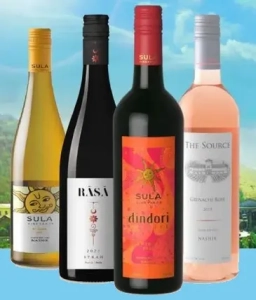Blog: Ray of Hope for Wine Consumers as Imported Duties may be decreased
Posted: Friday, 05 January 2024 11:35
Blog: Ray of Hope for Wine Consumers as Imported Duties may be decreased
Secretary in the Department for Promotion of Industry and Internal Trade (DPIIT) Rajesh Kumar Singh reportedly said that tariffs are not really considered a revenue source. Normally, customs duties or tariffs are used as a policy tool to ensure a higher level of protection for certain sectors to boost domestic manufacturing.
“The DPIIT’s view is that there are possibilities of using tariffs in a creative manner to protect some of our industries, particularly when they are subject to predatory pricing or dumping from certain geographies,” he told reporters in Delhi.
‘While there is a need to protect sectors which are weak, there is no need to continue with the high tariff walls for segments that are doing well. “But I think, over time, we will have to move to a lower tariff regime overall. The BCD (basic customs duty) will have to start coming down,” Singh said, adding “We cannot continue with the infant industry argument forever”.
These remarks assume significance as certain quarters of experts have stated that India should cut down its import duties to integrate with global value chains. However, some domestic industries like auto oppose that move.
Talking about the domestic toy industry, the secretary said that with the help of measures like high customs duties and quality control orders, the sector is performing well. Domestic toy manufacturing is strengthening, exports are increasing, and imports are coming down, he said. Singh said that for the toy sector, the government is using high customs duties to provide a higher level of protection for some time.
Without naming China, he said that some countries are using predatory pricing to dump goods and destroy local manufacturing. Duties on toys have been raised to 70 per cent from 20 per cent earlier.
When asked if the government is looking to cut these duties, he said it will depend on the sector’s performance going forward.
“We are facing a situation where one geography (country) in particular there is a sustained intent to destroy the manufacturing ecosystem in other countries through predatory pricing, thereby enhancing their prices. So, we need to sort of calibrate our move accordingly,” he added.
Though no specific mention has been made about duties on wine and spirits, all previous reports have clubbed them with autos during all the foreign trade agreements processed.
Our Commentary
Although there is no mention of the wine and spirits industry, the government needs to realize that the Indian wine and spirits industry is on a much firmer footing today. We see whisky industry competing with Scotch and foreign whiskies getting hot competition from the Indian moniker, especially in the Single Malt category Similarly, there are several instances of crafted gin, vodka and agave-based drinks and rum finding excellent traction.
Even the local wine industry is way ahead compared to the last 10 years. A bit more competition will expand the total market and also help us produce even better wines to compete in the world market or at least expand the domestic market with more choices, through the lower duties regime.
The government took this factor into some consideration in the FTA signed with Australia a year ago. FTA with EU and UK is currently in progress. The government could loosen the grip in this sector and get benefits in other sectors like visas, IT sectors etc.
Of course, one need not read windfall for the imported wines. It could be a sounding board or wishful thinking on the part of the government, but it will be a step in the right direction, for the wine and spirits industry. The relevant Associations ought to lobby with the government.
Unfortunately, there is no consumer front for this industry but it is obvious that the consumers like to have a better choice and with reduction in taxes, the government would be doing a favour to the industry in the long term, by making them more competitive.
Subhash Arora





Yes, I agree that Indian wines can definitely compete both in quality and pricing with imported wines.
Some of the Indian wines that received awards in the ProWine 2024 season, are definitely a class apart. Slowly, the Indian mind set is also changing towards Indian wines. Such changes are percolating to Indian wines from Indian Single Malts receiving best of the awards.